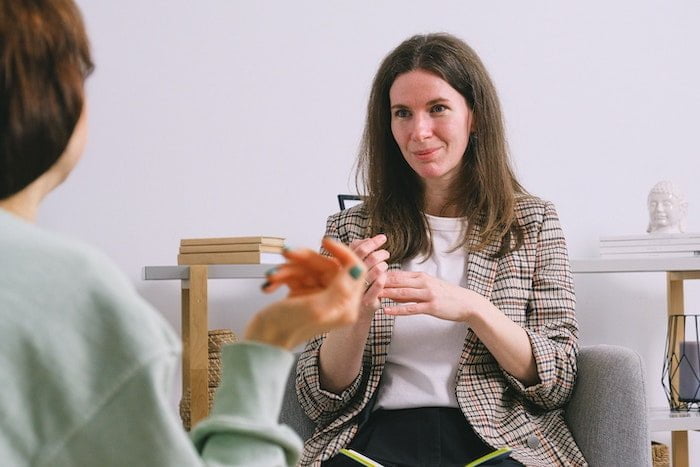Quick links for Cognitive Behavioural Therapy
- What is Cognitive Behavioural Therapy (CBT)?
- How does Cognitive Behavioural Therapy (CBT) treat addiction?
- What are the benefits of Cognitive Behavioural Therapy (CBT)?
- Which addictions can be treated with Cognitive Behavioural Therapy (CBT?)
- Which techniques are taught in Cognitive Behavioural Therapy (CBT)?
- References for Cognitive Behavioural Therapy (CBT)
Cognitive Behavioural Therapy (CBT) is an effective form of treatment for a wide range of addictions and mental health conditions.
It focuses both on the past and the future – drilling down to the root cause of the addiction while also providing the mental, emotional and behavioural tools needed to prevent relapse and continue healthy habits even after the treatment has ended.
What is Cognitive Behavioural Therapy (CBT)?

Patient and therapist talking together during CBT
CBT is a form of therapy that promotes an awareness of the overall connection between our thoughts, feelings and actions.
The belief is that our behaviour is deeply influenced by our thought patterns and that many issues such as substance abuse can be traced back to negative and deeply ingrained beliefs and thought processes.
By recognising and working through these thoughts, learning new ways of dealing with stress and carving out new thought patterns, CBT can empower people who are struggling with addiction to take control of their lives and help themselves to recover. [1]
Working with a counsellor, a person undergoing CBT will begin to identify their own damaging thought patterns and from there a personalised treatment plan will be created.
This can involve replacing unhelpful beliefs with positive thoughts, undertaking practical tasks in their personal life and self-reflective tasks such as completing worksheets.
CBT is not a quick fix. It requires dedication and perseverance, with most cognitive behavioural therapists advising a minimum of four weeks of CBT treatment.
How does Cognitive Behavioural Therapy (CBT) treat addiction?

Man sat holding his head whilst speaking to a therapist during a CBT session
When used to treat substance abuse and other addictions, CBT relies on two key features: functional analysis and skills training.
It is essential to consider both components when devising a treatment plan in order to maximise the effectiveness of cognitive behavioural therapy and increase the chances of long-term recovery.
Functional Analysis in Cognitive Behavioural Therapy (CBT)
The primary objective of functional analysis is to get to the root cause of the addiction.
A trained cognitive behavioural therapist will ask specific questions in order to drill down into the heart of the issue and discover the thought patterns, behaviours and circumstances that lead the person to develop an unhealthy dependency.
The therapist may ask the patient to recall a specific instance in the past where they used drugs, alcohol or displayed addictive behaviour and read further into their feelings, thoughts and consequences at this time.
This is also a helpful way to identify the specific situations that could become problematic during recovery, and an opportunity to learn new coping skills that will allow the person to function during daily life without the help of their addiction.

Young person in a Cognitive Behavioural Therapy session
Skills Training in Cognitive Behavioural Therapy (CBT)
When a person has become dependent on drugs, alcohol or other addictive behaviours, it usually means that they are attempting to use these substances as a way to cope with their underlying problems.
Skills training aims to teach a range of tools and techniques that can replace these self-destructive behaviours with positive, helpful skills.
This can include unlearning previous behaviours and thought patterns, dealing with feelings of stress and unhappiness in a healthy way and incorporating healthier practices into their daily life.
Once the regular CBT sessions have ended, the person is able to take these skills and tools with them as they navigate the world.
This can decrease the likelihood of relapse and help them live a happier, fulfilled and more mindful life.
What are the benefits of Cognitive Behavioural Therapy (CBT)?

Therapist taking notes with a patient during CBT
Cognitive behavioural therapy is a highly effective form of treatment, [2] providing help and relief to people struggling with addiction and other self-destructive behaviours.
It can feel overwhelming to even begin to think about selecting a treatment option, but researching the benefits of each form of addiction therapy is a great way to decide which one would work best for you.
Below are some of the main benefits of Cognitive Behavioural Therapy (CBT):
1. Evidence-based
There is a wealth of research and evidence surrounding cognitive behavioural therapy, and it has been scientifically proven to be effective [3] at treating various forms of addiction and mental health issues.
The techniques involved have been studied and tweaked carefully by professionals, and this form of therapy is considered to be of a very high standard.
2. Flexible
Cognitive behavioural therapy isn’t a one-size-fits-all solution.
Instead, it is a flexible and adaptable form of treatment that can be effective at managing a variety of addictions and mental health issues.
This gives people more options when choosing a form of therapy that works best for them, and it is malleable enough to provide help to a wide range of people.
3. Involves homework
CBT treatment isn’t confined to therapy sessions. It continues throughout the patient’s daily life, as worksheets and practical tasks are set for them to complete before the next session.
This ensures that they are regularly revisiting and practising the mindset shifts and positive thought patterns as they go about their day, setting the foundations for recovery and independence.

Patient and therapist having a CBT session at a residential rehab
4. Boosts confidence
Cognitive behavioural therapy actively works to identify negative and destructive beliefs and thought patterns, challenging them and replacing them with more helpful ones.
This fosters self-esteem and gives the patient a sense of self-understanding – they know why they developed an addiction and they know how to treat it.
These more positive and helpful thought patterns boost confidence, which is key to preventing future relapse.
5. Treats problems at the source
Some forms of treatment deal with the physical symptoms of addiction but fail to address the root cause of the issue.
CBT does the opposite – using specialised techniques, cognitive behavioural therapists are able to help the patient dig deep into their history to discover where the initial problem stemmed from and change the thought patterns associated with that issue.
6. Empowering
CBT gives the individual the mental, emotional and behavioural tools needed to help themselves even after the treatment has ended.
They are not reliant on regular therapy sessions or a dedicated therapist – rather, they have the knowledge and ability to recognise unhealthy thought patterns in their everyday life and make the changes required without help from anyone else.
Which addictions can be treated with Cognitive Behavioural Therapy (CBT?)

Patient and therapist talking to each other during a Cognitive Behavioural Therapy session
CBT has proven to be effective at treating a range of addictions.
This form of therapy can also help with a variety of issues that, if left untreated, could lead to substance abuse in the future.
The following are some of the most common issues that can be treated effectively with CBT:
- Bipolar disorder
- Anxiety and panic attacks
- Alcohol addiction
- Drug addiction
- Sex and love addiction
- Gambling addiction
- Obsessive-Compulsive Disorder (OCD)
- Post-Traumatic Stress Disorder (PTSD)
- Borderline Personalist Disorder (BPD)
- Depression
- Eating disorders
Cognitive behavioural therapists believe in treating the issue at the source. If an individual is struggling from a gambling addiction,
CBT treatment aims to get to the root cause of the addiction to discover where it stemmed from and why it continues.
This is one reason why cognitive behaviour therapy is often used in tandem to treat any mental health disorders that an individual may have alongside their addiction, also known as co-occurring disorders.
Which techniques are taught in Cognitive Behavioural Therapy (CBT)?

Group CBT session in progress at a drug and alcohol rehab clinic
The techniques used in CBT are specific to the individual’s unique situation and history, and no two courses of treatment will be the same.
However, there are a number of common techniques that are generally used throughout most treatments to help people struggling with addiction lower their stress levels, deal with potentially triggering situations and understand their own thought patterns and behaviours.
1. Journaling and Thought Records for Cognitive Behavioural Therapy (CBT)
Writing can be an extremely therapeutic form of self-care, and putting pen to paper is highly encouraged between cognitive behavioural therapy sessions.
It can be helpful to list negative thoughts that have cropped up during daily life, with another list detailing more positive thoughts that could be used to replace them.
Writing is also a great way to keep a record of progress and improvement throughout the course of the treatment and to see how far you have come.
2. Role Playing for Cognitive Behavioural Therapy (CBT)
The act of role-playing allows you to act out situations that may increase the chances of relapse in the future, and practice healthy ways of responding to them without the pressure of real-life consequences.
This brings the unknown into sharp focus and can help reduce fear and anxiety about the future.
It’s always helpful to have a plan for potentially harmful situations, and role-playing is one way to achieve this.

Therapist listening to a patient during a CBT session
3. Relaxation Techniques
A common reason for dependency or addiction is due to fear, anxiety and stress.
Many addictions start with the person attempting to use a substance to calm down or stave off potentially unpleasant feelings and emotions.
CBT teaches effective relaxation and mindfulness techniques that will allow you to stay calm and lower stress naturally, without the use of a substance or destructive behaviour.
These can include meditation, breathing exercises and muscle relaxation.
The sheer volume of positive research, studies and patient testimonials surrounding cognitive behavioural therapy [4] make it a very promising option if you are looking into treatments for addiction.
Our team can help you to get in touch with a range of CBT therapists – reach out today and we will be glad to lend a hand.
Find drug and alcohol rehabs in your local area.
References for Cognitive Behavioural Therapy (CBT)
[1] https://www.ncbi.nlm.nih.gov/pmc/articles/PMC5797481/
[2] https://www.ncbi.nlm.nih.gov/pmc/articles/PMC2897895/
[3] https://www.ncbi.nlm.nih.gov/pmc/articles/PMC5714654/
[4] https://www.ncbi.nlm.nih.gov/pmc/articles/PMC4219061/






